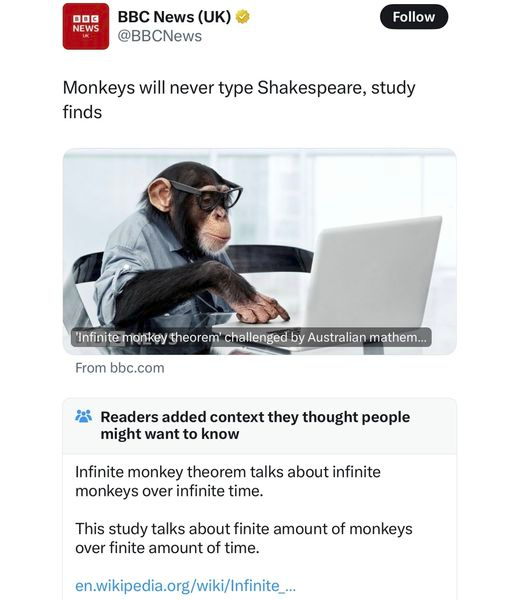this post was submitted on 03 Nov 2024
1166 points (98.7% liked)
Science Memes
17269 readers
437 users here now
Welcome to c/science_memes @ Mander.xyz!
A place for majestic STEMLORD peacocking, as well as memes about the realities of working in a lab.

Rules
- Don't throw mud. Behave like an intellectual and remember the human.
- Keep it rooted (on topic).
- No spam.
- Infographics welcome, get schooled.
This is a science community. We use the Dawkins definition of meme.
Research Committee
Other Mander Communities
Science and Research
Biology and Life Sciences
- !abiogenesis@mander.xyz
- !animal-behavior@mander.xyz
- !anthropology@mander.xyz
- !arachnology@mander.xyz
- !balconygardening@slrpnk.net
- !biodiversity@mander.xyz
- !biology@mander.xyz
- !biophysics@mander.xyz
- !botany@mander.xyz
- !ecology@mander.xyz
- !entomology@mander.xyz
- !fermentation@mander.xyz
- !herpetology@mander.xyz
- !houseplants@mander.xyz
- !medicine@mander.xyz
- !microscopy@mander.xyz
- !mycology@mander.xyz
- !nudibranchs@mander.xyz
- !nutrition@mander.xyz
- !palaeoecology@mander.xyz
- !palaeontology@mander.xyz
- !photosynthesis@mander.xyz
- !plantid@mander.xyz
- !plants@mander.xyz
- !reptiles and amphibians@mander.xyz
Physical Sciences
- !astronomy@mander.xyz
- !chemistry@mander.xyz
- !earthscience@mander.xyz
- !geography@mander.xyz
- !geospatial@mander.xyz
- !nuclear@mander.xyz
- !physics@mander.xyz
- !quantum-computing@mander.xyz
- !spectroscopy@mander.xyz
Humanities and Social Sciences
Practical and Applied Sciences
- !exercise-and sports-science@mander.xyz
- !gardening@mander.xyz
- !self sufficiency@mander.xyz
- !soilscience@slrpnk.net
- !terrariums@mander.xyz
- !timelapse@mander.xyz
Memes
Miscellaneous
founded 2 years ago
MODERATORS
you are viewing a single comment's thread
view the rest of the comments
view the rest of the comments

0.99999... repeating equals 1. Not close to 1. Equal to 1. The monkeys will necessarily type hamlet somewhere in the sequence. If your group of monkeys hasnt typed it yet, double the number of monkeys.
A monkey could type any infinite sequence of letters if it types at random. Since infinite sequences of single letters, repeating patterns, and those containing hamlet except one letter is wrong every time are all possible infinite sequences, it's possible that the money produces one of them.
Probability behaves strangely in infinite situations. A single monkey will almost surely produce the complete works of Shakespeare in infinite time... But this is partially a flaw of infinity in general.
As another example, let's say your monkey produces an infinite sequence containing hamlet. What is the probability of that particular sequence arising? It's 0. There is no chance of any particular sequence arising... And yet that one did arise! It was almost surely not going to be that one, but it was. The probability of any single infinite sequence arising is 0, but nonetheless one of them will be the outcome.